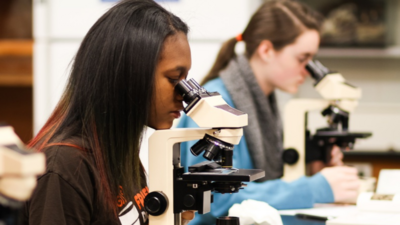Why Major in Chemistry, Biology or Physics?

Chemistry, biology and physics – chances are that, in one way or another, you have opinions about these topics and the idea of studying them in college. Are they difficult and technical, perhaps? Do they excite you and fill you with passion? Or see them as a good place to make new discoveries? Whatever your ideas of these three core branches of the field of natural science are, they are options that may come up when you consider your academic major at Concordia University, Nebraska. So, why would you choose one as your major, anyway?
Broad Skill-Developing Opportunities
If there is any field that will help you more than others to develop skills that you’ll use both within and outside of the workplace, it is that of natural science. The scientific method, which is a key aspect of inquiry in the natural sciences, necessitates proper critical thinking and problem-solving skills. These skills both arise from and inform how students carry out the experimentation and observation included in the scientific process.
Courses in the natural sciences will develop these skills in students. Making observations while completing laboratory work requires attention to detail and pattern recognition. Data analysis takes patience, organization ability, and the capacity to interpret the meaning of numbers. Likewise, research work and experimentation require students to solve problems independently and reason through their ideas.
Lucrative Career Choices
Although salary should not be a student’s only reason for choosing a certain major, the numbers are clear: physicists, chemists and biologists are unlikely to lack a high-paying career. According to the Bureau of Labor Statistics, scientists in these fields commonly earn over $100,000 annually. While the variation between specific areas of work is highly variable, nearly all salaries of natural scientists – even those of bachelor’s degree-holders – are typically above the median salary of $63,000 for all fields.
Plus, students who major in chemistry, biology, or physics have a myriad of options for further specialization, especially if they intend to pursue graduate school. From anesthesiology to zoology, the choices are limitless. No matter what degree you wish to hold, the area of the world where you want to work, or the populations you hope to serve, there is undoubtedly a job in the natural sciences for you.
Unique Appreciation for God’s Creation
Biologists, chemists and physicists have the opportunity to explore the finer points of God’s creation in their work each day. Whether they research the effects of chemical substances on humans, nurse animals back to health in a veterinarian’s office, or study the ecological impacts of climate change, natural scientists both know and continue to learn about the most intricate beauties of God’s creation. Students who graduate from Concordia University, Nebraska will be uniquely prepared to do so in their vocations both as scientists and Christians.
Lifelong Learning
Although many natural science careers involve research, which contributes in a more obvious way to continued learning after one’s schooling, lifelong learning is present in all natural sciences careers. Healthcare workers learn every day from the lived experiences of patients with certain conditions, just as professors and teachers learn more effective teaching practices by observing and talking to their students.
Majoring in the natural sciences, therefore, sets the stage for continued growth and learning throughout one’s life. No matter how technical and data-driven the fields of chemistry, biology and physics may seem, they truly require students to maintain an open mind, a love for learning, and mental flexibility. So if you’re considering choosing one of these as your discipline of choice in college, you can look forward to learning and growing more than you ever thought possible!
Interested in studying the natural sciences at Concordia University, Nebraska? Learn more here.
Related Stories


